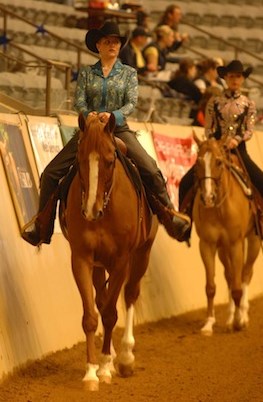Horse shows are fun but they can also be stressful. One of the biggest stressors—let’s face it—is a horse that gets nervous at a show. If your horse is a show-time jitter-bug, are you sure you’re not part of the problem?

“You may think you’re being calm, but your horse can pick up on signals you don’t even know you’re sending,” says Bonnie Beaver, DVM, a professor of veterinary medicine at Texas A&M University. Board-certified in animal behavior and a horse-show veteran herself, Dr. Beaver says the most important factor in keeping your horse on an even keel is how youbehave.
“Recent studies indicate that even if you’re saying reassuring things to your horse like ‘Easy, relax,’ it won’t help calm him unless your actions and body language reinforce that message.”
She says the research shows that your voice alone can’t help your horse as much as it might help, say, your dog. For your horse, it’s less about the tone of your voice than how you’re interacting with him.
“Being abrupt with the reins, holding them too tightly, gripping your horse’s sides with your legs—all these are ‘I’m nervous’ signals that your horse picks up on and responds to,” says Dr. Beaver. “Then each of you feeds off the other in a vicious circle.”
The key, then, is to do all you can to be mentally prepared before the event so you can feel as truly relaxed as possible at the show. This requires diligent advance work.
“Know the rules you’ll be showing under, and what your horse will be required to do,” advises Dr. Beaver. “Know which cues your horse responds to and how best to use them. Know exactly when your classes are and have a plan for getting to the gate on time.” It helps to have someone to assist you who knows the routine and requirements, too.
Then, once you’re in the ring, ride the way you do at home. “Don’t ask for more than you’ve schooled your horse for—you’ll just confuse and upset him,” she says. “Take a deep breath, relax, and let him show what he can do.”
Bonus tip: Because noise can be especially upsetting for horses, Dr. Beaver also suggests you do all you can to prepare your horse in advance for the sounds he’ll experience at the show.
“And,” she adds, “if your horse still seems upset by the noise, consider using equine ear plugs.”
Want more stay-calm advice? Check out these jitter-busting tips from Quarter Horse judge Gary Reynolds and all-around trainer Karen Wildes. Or click here to review how to use your smart, rational brain to calm your reactive, emotional brain. Or browse related books: Pressure-Proof Your Riding; Overcoming The Psychological Challenges of Riding.






